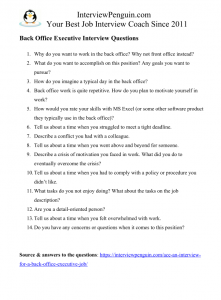Out of the spotlight and the eyes of the customers, back office is a great place to work. You can always have a cup of coffee on your desk, and can afford to loosen your tie, or even leave it at home, if your managers aren’t too strict about it. The stress levels are typically lower, simply because you don’t have direct confrontation with the customers (and sometimes with the managers as well), but you will still have your daily and weekly goals, and won’t simply hang around talking with your colleagues, or checking your Instagram feed.
Hiring managers will typically ask you some personal and behavioral questions. They try to understand your personality, goals, and your attitude to various situations that can happen daily in a back office (lacking motivation to work when there’s no supervision, conflict with a colleague, working on multiple projects at the same time, and so on). Let’s have a look at the questions, and how you should answer them.
Table of Contents
Why do you want to work in the back office? Why not front office instead?
You have a few options for a good answer to this one. One is saying that people skills aren’t your greatest strength, and that you prefer to work with data, instead of having to deal with interaction with the customers. It is simply a more fitting role for someone like you.
Another option is saying that you do not really have a preference, you simply want to have any administrative role (a fitting position considering your education, skills, and experience), and since you like their job offer (working environment, type of back office work, their brand, salary offer), you decided to apply for the job.
What do you want to accomplish on this position? Any goals you want to pursue?
Once again, you have couple of good options at this point. One is picking some position you’d like to have in the future–office manager, data analyst, market research analyst, whatever. Fresh of high school or fresh of college, however, you know it isn’t realistic to succeed in the interview for one of those jobs right now.
Hence you prefer to start in the back office–where the pressure isn’t so high, learn the ins and outs of MS Excel, MS Access, and other software applications, and when the time is right, progress to your desired position–ideally within their company.
Another option is claiming that you do not dream about any big accomplishments. You read the job description, you believe you will handle the workload, and will simply try to meet your weekly and monthly targets, earning a decent salary as a reward for your effort. Of course, nobody knows what tomorrow will bring, and you may end up chasing promotion, or some completely different career. At the moment, however, you do not think about these issues. You simply want to do a good job, and that’s it.
* May also interest you: Office Coordinator interview questions.
How do you imagine a typical day in the back office?
This obviously depend on your place of work, and the department of the company. Back office executives work in IT, accounting, clearance, record maintenance, and other departments of big corporations and banks.
In general, however, you will spend the majority of your working time in front of a computer screen, and you should ensure the hiring managers that you expect to do exactly that. You can talk about collecting data, organizing it, checking them for accuracy or analyzing it, basically working with data, without having any contact with the customers.
Needless to say, you should read the job description carefully and adjust your answer to the exact back office role. But you won’t spoil anything saying that you expect to sit at your desk, stare at the computer screen, and work with data.
Back office work is quite repetitive. How do you plan to motivate yourself in work?
Even here you have several good options. One is saying that you actually prefer repetitive work–you aren’t the most creative mind in the city, and instead of facing the unknown and dealing with some new challenges every day, you prefer to know what to expect, have a standard set of working duties, and take care of them, day after day.
Second option consists in talking about goals you have outside of job. You want to provide for your family, pay for your education, or finally get out of debt–hence you need money, and if you under-deliver on a continuous basis, you will lose the job. There’s not something you can afford right now. Sure, the job may be boring, but you know what gets you up in the morning, and your goals will help you to stay motivated, getting your tasks done day after day… You can also check 7 sample answers to this question about motivation in repetitive jobs.
How would you rate your skills with MS Excel (or some other software product they typically use in the back office)?
Keep on your mind that they may ask you to do a practical test later on (asking you to take care of some tasks in MS Excel), so it is better to stay modest here (unless you are real Excel pro, of course).
You can say that you have decent skills with MS Excel, but perhaps you haven’t worked with the software in a while, so you will need a few days to polish your skills and get into the groove. At the same time, however, you are tech savvy, and have no doubt that after a few days in job (or after an initial training), you will handle any software they have in place.
Tell us about a time when you struggled to meet a tight deadline.
You will have many deadlines in your back office job. And in some cases you will have to push extra hard, or even stay a couple of hours overtime, to handle the workload, to deliver some report or analysis on time, simply to meet a deadline. And that’s exactly what they want to hear from you.
You can talk about a deadline from school, from work, or even from your personal life. The key is to demonstrate that you do not mind stepping out of your comfort zone, staying overtime, working extra hard, or even asking your colleagues for help, in order to eventually meet the deadline.
Describe a conflict you had with a colleague.
Another behavioral question, another test of your attitude. You won’t meet or talk with the clients while working in the back office, but it doesn’t mean that you will be an isolated unit in the company… You will report to someone, and you will have some colleagues in your department (can be two but also fifty, it really depends on the department and the organization of the workforce).
Try to talk about a conflict with a good outcome. Sure, we cannot avoid conflicts. But we can learn to approach them with a cool head, not getting involved in them personally, always trying to understand the point of view of the other conflict party, keeping the talk professional, and without any insults. And that’s exactly what they are looking for in your description of a conflict situation…
Other questions you may face in your back office interview
- Tell us about a time when you went above and beyond for someone.
- Describe a crisis of motivation you faced in work. What did you do to eventually overcome the crisis?
- Tell us about a time when you had to comply with a policy or procedure you didn’t like.
- What tasks do you not enjoy doing? What about the tasks on the job description?
- Are you a detail-oriented person?
- Tell us about a time when you felt overwhelmed with work.
- Do you have any concerns or questions when it comes to this position?
* You can also download the full list of questions in a one page long PDF, and practice your interview answers anytime later:

Final thoughts, next steps
Interviews for back office jobs belong to interviews with average difficulty. On one hand, the hiring managers won’t typically ask you any tricky technical questions. Each big corporation has a training program for new hires in place, and you will learn how to handle the tasks directly on the job.
On the other hand, jobs in big corporations are extremely popular, and it may easily happen that you compete with 20 other people for a simple back office job. It isn’t easy to stand out from your competitors, especially if they have better qualifications…
Anyway, do a good research about your future employer, and try to prepare for the questions you may face. I hope you will manage to do so, and will get the job. Good luck!
Matthew
May also interest you:
- Office manager interview questions.
- Market research analyst interview questions – Are you interviewing for a back office job in market research? Check the questions you will face.
- Salary negotiation tips – Learn how to get as much as you deserve–if not more…

